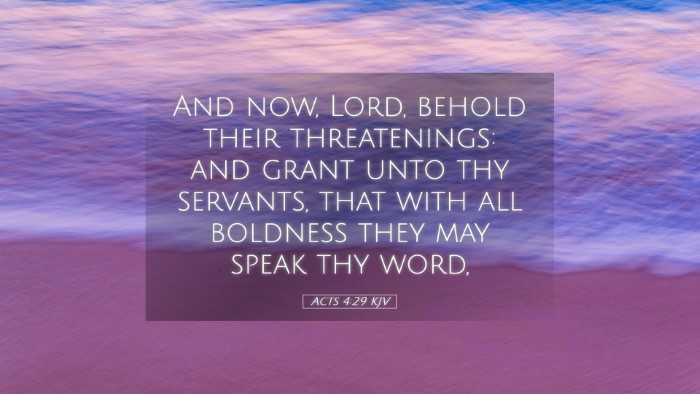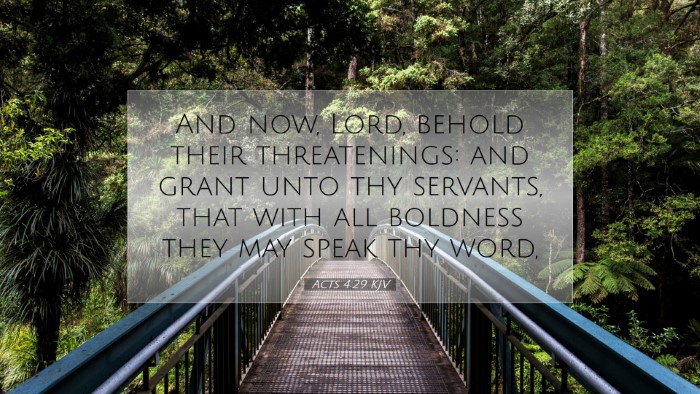Commentary on Acts 4:29
In the context of Acts 4:29, we find a compelling moment in the early church where the apostles are facing persecution for their witness of Christ's resurrection. This verse serves as a crucial prayer of the disciples, demonstrating their reliance on God amid adversity.
Text of the Verse
"And now, Lord, behold their threatenings: and grant unto thy servants, that with all boldness they may speak thy word."
Summary of Insights from Commentators
Matthew Henry
Matthew Henry emphasizes the community aspect of prayer in this passage. The disciples are not praying as individuals but collectively, which highlights the strength found in unity. Henry points out that their prayer is directed towards the Lord, acknowledging His sovereignty over their situation. He notes:
- Recognition of Threats: The disciples do not hide or ignore the threats they face; they bring them before God, showcasing their faith to confront difficulties.
- Desire for Boldness: They ask specifically for boldness to speak God's word, indicating their commitment to evangelism despite opposition.
Albert Barnes
Albert Barnes provides a systematic approach to understanding the implications of this prayer. He highlights the importance of recognizing opposition in the Christian walk and how it impacts ministry. Barnes observes:
- Theological Significance: The plea for boldness reveals that the apostles understood their mission as one requiring divine empowerment.
- A Lesson on Fearlessness: Barnes underscores that the disciples sought courage from God rather than relying on their own strength, serving as a powerful lesson for modern believers facing societal pressures.
Adam Clarke
Adam Clarke expands on the emotive aspects of the verse, delving into the spiritual fervor that characterizes the early church. He notes the 'immediacy' of their request after being threatened, pointing out:
- Urgency in Prayer: Their prayer was immediate and earnest, reflecting the gravity of their situation. Clarke suggests that this urgency is essential in the lives of believers.
- The Importance of Community Prayer: Clarke emphasizes that the prayer was not individualistic but a collective appeal, showing the power of the church united in purpose.
Application for Pastors, Students, and Theologians
The insights gained from this verse are profoundly relevant for contemporary believers, especially pastors and church leaders. They serve as a reminder of the necessity for:
- Prayerfulness: Regularly bringing challenges before God in prayer, acknowledging both the reality of opposition and the need for divine assistance.
- Boldness in Proclamation: A commitment to faithfully proclaiming God's word, despite the potential for backlash or persecution.
- Community Engagement: The need for churches to come together in prayer and worship, building a strong communal identity centered around Christ.
- Empowerment by the Spirit: Understanding that any boldness to speak about one's faith must be rooted in the empowerment of the Holy Spirit.
Conclusion
Acts 4:29 encapsulates a response to persecution that is anchored in prayer and empowered by God. The legacy of the early church, as portrayed through this verse, is one of courage, unity, and reliance on divine strength. As modern believers seek to navigate their own challenges, they find in this passage both a blueprint and a source of encouragement to face their circumstances head-on.


